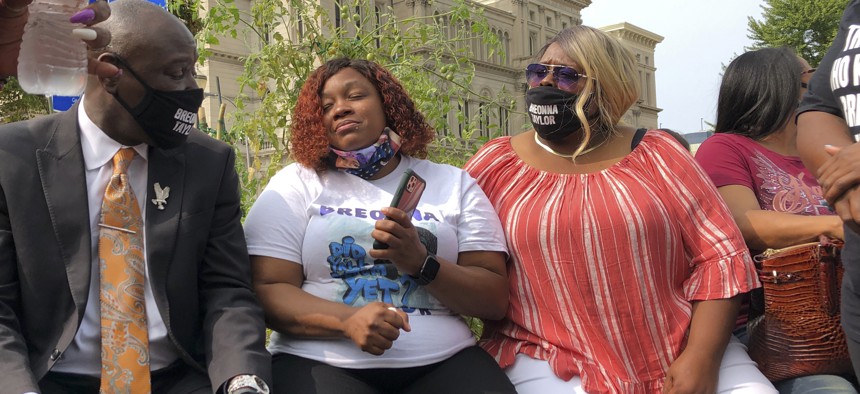Louisville Agrees to $12 Million Settlement and Police Reforms After Death of Breonna Taylor

Tamika Palmer, Breonna Taylor's mother, in white beside Attorney Ben Crump, left, speak in Louisville, Ky., after settlement was announced. AP Photo
STATE AND LOCAL NEWS ROUNDUP | Minneapolis police making fewer traffic stops … Maryland needs to decide how to complete transit project after contractors leave … Private schools will get less CARES Act money than U.S. Department of Education wanted.
The city of Louisville will pay Breonna Taylor’s family $12 million and commit to certain police reforms as part of the settlement of a lawsuit against the police department. Taylor, a Black woman, was killed by white officers in March during a raid on the 26-year-old emergency room technician’s apartment. Taylor’s death has sparked nightly protests in the Kentucky city, as well as others around the country, and already prompted Louisville and a number of other municipalities or departments to change their policies on how police execute search warrants. The settlement was inked remarkably quickly, as many families spend years litigating civil rights lawsuits after a relative is killed by police. Lonita Baker, one of the attorneys representing Taylor’s family, said the inclusion of the changes to policing in the city was crucial to the deal. “It’s important for her family that they minimize the risk of what happened to Breonna Taylor happening to any other family,” Baker said. The settlement, the largest ever paid by Louisville police, includes implementation of an early warning system to identify troubled officers, hiring social workers to accompany officers on certain calls, requiring further changes to search warrant procedures and the mandatory presence of paramedics when warrants are executed. The settlement will also mandate that the city create an incentive for police officers to live in low-income neighborhoods. While protesters have been calling for the state attorney general to charge the officers involved in the shooting, experts have said a successful prosecution could be difficult, as Taylor’s boyfriend fired first when officers barged in to search the apartment as part of a drug investigation. Police had a “no knock warrant,” but said they announced themselves. Kenneth Walker, her boyfriend, has said he and Taylor didn’t hear police identify themselves and thought an intruder was trying to force his way into the apartment. “My hope is this agreement is the next step in building a more just Louisville. A more just Louisville is the medicine we need to heal,” said Jefferson County Attorney Mike O’Connell. [Courier Journal; New York Times; WLKY]
TRAFFIC STOPS | Police in Minneapolis have been making an average of 80% fewer traffic stops each week since May 25, when George Floyd was killed by a police officer, according to an analysis by Bloomberg CityLab. The decline raises questions about whether police have “pulled back” from enforcement in the city. But some critics say the Minneapolis Police Department’s prior use of stops wasn’t effective and alienated Black residents who were disproportionately targeted. [Bloomberg CityLab]
TRANSIT TROUBLES | The state of Maryland will need to figure out whether to continue on with building a new subway line itself or get a new contractor after a judge ruled that the current contractors can walk away from the project. The purple line, part of the Washington, D.C. area’s Metro system that will connect Maryland suburbs, had been plagued by change orders and $800 million in cost overruns. State officials Tuesday said they still haven’t decided how to proceed with the 16-mile project. [Bethesda Beat]
PRIVATE SCHOOLS l A federal judge rejected a Trump administration rule that would have sent much more coronavirus relief money to private schools than critics argued Congress meant to allocate to them. The U.S. Department of Education last week said the rule is no longer in effect because of the judge’s ruling. One analysis said the plan backed by U.S. Education Secretary Betsy DeVos would have resulted in private schools receiving $1.5 billion in CARES Act money instead of $127 million. [NPR]
DON’T MISS: New York City kept some schools open for the children of essential workers during the worst of the city’s Covid-19 pandemic. The New Yorker looked at that experience.
PENNSYLVANIA RESTRICTIONS | Restrictions in Pennsylvania that limit how many people can gather indoors and outside violate the First Amendment, a federal judge ruled in a decision that Gov. Tom Wolf plans to appeal. A spokeswoman for the governor noted the decision does not apply to other rules currently in place, such as mask requirements. [SpotlightPA]
Laura Maggi is the managing editor of Route Fifty.
NEXT STORY: When It Comes to Our Current Housing Crisis, Cities Can’t Wait for the Federal Government to Help






